- Home
- Michael Bond
Paddington on Top Page 2
Paddington on Top Read online
Page 2
Paddington looked up from the stewpot. “Would anyone else like any seconds?” he asked hopefully.
The headmaster removed an invisible speck of dust from his lapel as he gathered his thoughts. It had taken him a long while to explain to the Browns all that had happened to Paddington at St. Luke’s. It hadn’t been an easy task, particularly as he still wasn’t sure of all the facts himself.
“The long and short of it is,” he said, “we . . . er . . . that is, my colleagues and I, feel that until young Mr. Brown has a proper school uniform he’d be much better off staying at home.”
“A school uniform?” broke in Mrs. Brown. She looked at Paddington. “But we shall never get one to fit him.”
The headmaster gave a cough as he rose to his feet. “Er . . . exactly,” he said. “I’ve had a word with the Inspector, and in the circumstances he’s perfectly happy to take my advice. All in all I think it will be much the best thing.”
He paused at the door and looked back at Paddington with the suspicion of a twinkle in his eye. “I’m sure you’ll be pleased to know,” he said, “that your suspicions were ill-founded. Mr. Eustace’s tin hadn’t fallen in the stew after all. We found it under the table. Both the worms and Mr. Eustace are doing very well.
“I have a feeling,” he said, addressing Mrs. Brown as he made to leave, “that in any case, there’s not much we at St. Luke’s can teach bears.”
“I wonder what he meant by that last remark?” said Mrs. Brown, when she came into the room after saying good-bye to the headmaster. “Have you any idea, Paddington?”
But Paddington had his eyes closed. One way and another it had been a tiring day at school, and he wasn’t at all sorry to put his paws up.
Mrs. Brown sighed. She sometimes wished it wasn’t quite so hard to tell what he was thinking.
“If you ask me,” said Mrs. Bird, reading her thoughts, “it’s probably just as well. There’s no knowing what we might find out—especially when it comes to school-bears!”
Chapter Two
PADDINGTON CLEANS UP
Paddington peered through the letter box at Number thirty-two Windsor Gardens with a look of surprise on his face.
In point of fact, he’d been watching out for the postman, but instead of the blue-gray uniform he’d hoped to see, Mr. Curry, the Browns’ next-door neighbor, had loomed into view. Mr. Curry looked as if he was in a bad temper. He was never at his best in the morning, but even through the half-open flap it was plain to see he was in an even worse mood than usual. He was shaking a rug over the pavement, and from the cloud of dust surrounding him it looked as though he had been cleaning out his grate and had just had a nasty accident with the ashes.
The expression on his face boded ill for anyone who happened to come within his range of vision, and it was unfortunate that his gaze alighted on the Browns’ front door at the very moment when Paddington opened the letter box.
“Bear!” he bellowed. “How dare you spy on me like that? I’ve a very good mind to report you!”
Paddington let go of the flap as if it had been resting in hot coals, and gazed at the closed door with a very disappointed air indeed. Apart from an occasional catalog, he didn’t get many letters, but all the same, he always looked forward to seeing the postman arrive, and he felt most aggrieved at being deprived of his morning’s treat, especially as he’d been half-expecting a postcard from his Aunt Lucy in Peru. Something she’d said when she’d last written had given him food for thought, and he was anxiously awaiting the next installment.
All the same, he knew better than to get on the wrong side of Mr. Curry, so he decided to forget the matter and pay his daily visit to the nearby market in the Portobello Road instead.
A few minutes later, having taken his shopping basket on wheels from the cupboard under the stairs, he collected Mrs. Bird’s shopping list, made sure the coast was clear, and set out on his journey.
Over the years, Paddington’s basket on wheels had become a familiar sight in the market, and it was often much admired by passersby. Paddington took great care of it. He’d several times varnished the basketwork, and the wheels were kept so well oiled there was never a squeak. Earlier in the year, Mr. Brown had bought him two new tires, so all in all it still looked as good as new.
After he’d completed Mrs. Bird’s shopping, Paddington called in at the bakers for his morning supply of buns. Then he carried on down the Portobello Road in order to visit the antique shop belonging to his friend, Mr. Gruber.
Paddington liked visiting Mr. Gruber. Apart from selling antiques, Mr. Gruber possessed a large number of books, and although no one knew if he’d actually read them all, it certainly seemed as though he must have, for he was a mine of information on almost every subject one could think of.
When he arrived he found Mr. Gruber sitting on the horsehair sofa just inside his shop, clutching a particularly large volume.
“You’ll never guess what today’s book is about, Mr. Brown,” he said, holding it up for Paddington to see. “It’s called DISEASES OF THE COCOA BEAN, and there are over seven hundred and fifty pages.”
Paddington’s face grew longer and longer as he listened to Mr. Gruber recite from the long list of things that could happen to a cocoa bean before it actually reached the shops. He always rounded off his morning excursions with a visit to his friend, and Mr. Gruber’s contribution to the meeting was a never-ending supply of cocoa, which he kept at the ready on a small stove at the back of the shop. It didn’t seem possible that this could ever come to an end.
“Perhaps we’d better get some more stocks in, Mr. Gruber,” he exclaimed anxiously, when there was a gap in the conversation.
Mr. Gruber smiled. “I don’t think there’s any risk of our going short yet awhile, Mr. Brown,” he replied, as he busied himself at the stove. “But I think it does go to show how we tend to take things for granted. We very rarely get something for nothing in this world.”
Paddington looked slightly relieved at Mr. Gruber’s reassuring words. All the same, it was noticeable that he sipped his cocoa even more slowly than usual, and when he’d finished he carefully wiped round his mug with the remains of a bun in order to make sure he wasn’t letting any go to waste.
Even after he’d said good-bye to Mr. Gruber, he still had a very thoughtful expression on his face. In fact, his mind was so far away, it wasn’t until he rounded a corner leading into Windsor Gardens that he suddenly came back to earth with a bump as he realized that while he’d been in the shop, someone had pinned a note to his shopping basket.
It was short and to the point. It said:
YOUR SHOPPING BASKET ON WHEELS IS IN SUCH GOOD CONDITION IT SHOWS YOU HAVE CHARACTER, DRIVE, AND AMBITION. THIS MEANS YOU ARE JUST THE KIND OF PERSON WE ARE LOOKING FOR. YOU COULD EARN £200 PER WEEK WITH NO MORE EFFORT THAN IT TAKES TO VISIT THE GROCERS. I WILL BE IN TOUCH SOON WITH FURTHER DETAILS.
It was written in large capital letters and it was signed YOURS TRULY, A WELL-WISHER.
Paddington read the note several times. He could hardly believe his eyes. Only a moment before he’d been racking his brains to think up ways of earning some extra money so that he could buy Mr. Gruber a tin or two of cocoa; and now, out of nowhere, came this strange offer. It couldn’t have happened at a better moment, especially as he’d been tempted to break into the savings which he kept in the secret compartment of his suitcase, and which he held in reserve for important occasions, like birthdays and Christmas.
It was hard to believe he could earn so much money simply because he’d kept his shopping basket clean, but before he’d had a chance to consider the matter he saw a man in a fawn raincoat approaching. The man was carrying a large cardboard box which seemed to contain something heavy, for as he drew near he rested it on Paddington’s basket while he paused in order to mop his brow.
He looked Paddington up and down for a moment and then held out his hand. “Just as I thought!” he exclaimed. “It’s nice when you have a picture of someone
in your mind and they turn out exactly as you expected. I’m glad you got my note. If you don’t mind me saying so, sir, you should go far.”
Paddington held out his paw in return. “Thank you, Mr. Wisher,” he replied. “But I don’t think I shall go very far this morning. I’m on my way home.” He gave the man a hard stare. Although he was much too polite to say so, he couldn’t really return the man’s compliments. From the tone of the letter, he’d expected someone rather superior, whereas his new acquaintance looked more than a trifle seedy.
Catching sight of Paddington’s glance, the man hastily pulled his coat sleeves down over his cuffs. “I must apologize for my appearance,” he said. “But I’ve got rid of . . . er, I’ve obtained so many new clients for my vacuum cleaners this morning I don’t know whether I’m coming or going. I haven’t even had time to go home and change.”
“Your vacuum cleaners!” exclaimed Paddington in surprise.
The man nodded. “I must say, sir,” he continued, “it’s your lucky day. It just so happens that you’ve caught me with my very last one. Until I take delivery of a new batch later on, of course,” he added hastily.
Taking a quick glance over his shoulder, he produced a piece of pasteboard, which he held up in front of Paddington’s eyes for a fleeting moment before returning it to an inside pocket.
“My card,” he announced. “Just to show that all’s above board and Sir Garnet-like.
“You, too, could become a member of our happy band and make yourself a fortune. Every new member gets, free of charge, our latest model cleaner, and . . . for today only, a list of do’s and don’ts for making your very first sale.
“Now.” He slapped the box to emphasize his point. “I’m not asking forty pounds for this very rare privilege. I’m not asking thirty-five. I’m not even asking thirty. To you, because I like the look of your face, and because I think you’re just the sort of bear we are looking for, twenty-five pounds!”
His voice took on a confidential tone. “If I was to tell you the names of some of the people I’ve sold cleaners to, you probably wouldn’t believe me. But I won’t bore you with details like that. You’re probably asking yourself what you have to do in order to earn all this money, right? Well, I’ll tell you.
“You sell this cleaner for thirty pounds, right? You then buy two more cleaners for twenty-five pounds each and sell them for thirty, making fifteen pounds in all, right? Then you either keep the money or you buy six more cleaners and sell those. If you work hard, you’ll make a fortune so fast you won’t even have time to get to the bank.
“Another thing you may be asking yourself,” he continued, before Paddington had time to say anything, “is why anyone who already has a vacuum cleaner should buy one of ours?”
He gave the box another slap. “Never fear, it’s all in here. Ask no questions, tell no lies. With our new cleaner, you can suck up anything. Dirt, muck, ashes, soot . . . pile it all on, anything you like. A flick of the switch and whoosh, it’ll disappear in a flash.
“But,” he warned, “you’ll have to hurry. I’ve a queue of customers waiting round the next corner.”
Paddington needed no second bidding. It wasn’t every day such an offer came his way, and he felt sure he would be able to buy an awful lot of cocoa for fifteen pounds. Hurrying behind a nearby car, he bent down and opened his suitcase.
“Thank you very much,” said the man, as Paddington counted out twenty-five shiny one pound coins. “Sorry I can’t stop, guv, but work calls . . .”
Paddington had been about to enquire where he could pick up his next lot of cleaners, but before he had a chance to open his mouth, the man had disappeared.
For a moment, he didn’t know what to do. He felt very tempted to take the cleaner straight indoors in order to test it in his bedroom, but he wasn’t at all sure Mrs. Bird would approve. In any case, Number thirty-two Windsor Gardens was always kept so spotlessly clean, there didn’t seem much point.
And then, as he reached the end of the road, the matter was suddenly decided for him. Mr. Curry’s front door shot open and the Browns’ neighbor emerged once again carrying a dustpan and brush.
He glared at Paddington. “Are you still spying on me, bear?” he growled. “I’ve told you about it once before this morning.”
“Oh, no, Mr. Curry,” said Paddington hastily. “I’m not spying on anyone. I’ve got a job. I’m selling a special new cleaner.”
Mr. Curry looked at Paddington uncertainly. “Is this true, bear?” he demanded.
“Oh, yes,” said Paddington. “It gets rid of anything. I can give you a free demonstration if you like.”
A sly gleam entered Mr. Curry’s eyes. “As a matter of fact,” he said, “it does so happen that I’m having a spot of bother this morning. I’m not saying I’ll buy anything, mind, but if you care to clear up the mess I might consider it.”
Paddington consulted the handwritten list of instructions which was pinned to the box. He could see that Mr. Curry was going to come under the heading of CUSTOMERS—VERY DIFFICULT.
“I think,” he announced, as the Browns’ neighbor helped him up the step with his basket on wheels, “you’re going to need what we call the ‘full treatment.’”
Mr. Curry gave a snort. “It had better be good, bear,” he said. “Otherwise I shall hold you personally responsible.”
He led the way into his dining room and pointed to a large pile of black stuff in the grate. “I’ve had a bad fall of soot this morning. Probably to do with the noise that goes on next door,” he said meaningly.
“My cleaner’s very good with soot, Mr. Curry,” said Paddington eagerly. “Mr. Wisher mentioned it specially.”
“Good,” said Mr. Curry. “I’ll just go and finish emptying my dustpan and then I’ll be back to keep an eye on things.”
As the Browns’ neighbor disappeared from view, Paddington hurriedly set to work. Remembering the advice he’d been given a short while before, he decided to make certain he gave Mr. Curry a very good demonstration indeed.
Grabbing hold of a broom which was standing nearby, he quickly brushed the soot into a large pile in the middle of the hearth. Then he poked the broom up the chimney and waved it around several times. His hopes were speedily realized. There was a rushing sound and a moment later an even bigger load of soot landed at his feet. Ignoring the black clouds which were beginning to fill the room, Paddington removed the cardboard box from his basket, and examined Mrs. Bird’s shopping. As he’d feared, some of it had suffered rather badly under the weight and he added the remains of some broken custard tarts, several squashed tomatoes, and a number of cracked eggs to the pile.
It was while he was stirring it all up with the handle of the broom that Mr. Curry came back into the room. For a moment he stood as if transfixed.
“Bear!” he bellowed. “Bear! What on earth do you think you’re doing?”
Paddington stood up and gazed at his handiwork. Now that he was viewing it from a distance he had to admit it was rather worse than he intended.
“It’s all part of my demonstration, Mr. Curry,” he explained, with more confidence than he felt.
“Now,” he said, putting on his best salesman’s voice as he consulted the instructions again, “I’m sure you will agree that no ordinary cleaner would be any good with this mess.”
For once in his life it seemed that Mr. Curry was in complete and utter accord with Paddington. “Have you taken leave of your senses, bear?” he spluttered.
Paddington gave the cardboard box a slap. “No, Mr. Curry,” he exclaimed. “Never fear, it’s all in here. Ask no questions, I’ll tell no lies.”
Mr. Curry looked as if there were a good many questions he was only too eager to ask, but instead he pointed a trembling finger at the box.
“Never fear, it’s all in here!” he bellowed. “It had better all be in there! If it’s not all in there within thirty seconds, I shall . . . I shall . . .”
Mr. Curry paused for breath, suddenly
at a loss for words.
Taking advantage of the moment, Paddington opened the lid of the box and withdrew a long piece of wire with a plug on the end.
He peered at the skirting board. “Can you tell me where your socket is, Mr. Curry?” he enquired.
If Paddington had asked the Browns’ neighbor for the loan of a million pounds he couldn’t have had a more unfavorable reaction. Mr. Curry’s face, which had been growing redder and redder with rage, suddenly went a deep shade of purple as he gazed at the object in Paddington’s paw.
“My socket?” he roared. “My socket? I haven’t any sockets, bear! I don’t even have any electricity. I use gas!”
Paddington’s jaw dropped, and the plug slipped from his paw and fell unheeded to the floor as he gazed at the Browns’ neighbor. If Mr. Curry’s face had gone a deep shade of purple, Paddington’s—or the little that could be seen of it beneath his fur—was as white as a sheet.
He wasn’t sure what happened next. He remembered Mr. Curry picking up the cardboard box as if he was about to hurl it through the window, but he didn’t wait to see any more. He dashed out through the front door and back into Number thirty-two Windsor Gardens as if his very life depended on it.
To his surprise the door was already open, but it wasn’t until he cannoned into Mr. Gruber that he discovered the reason why. His friend was deep in conversation with the other members of his family.
For some reason they seemed even more pleased to see him than he was to see them.
“There you are!” exclaimed Mrs. Bird.
“Thank goodness,” said Mrs. Brown thankfully.
“Are you all right?” chorused Jonathan and Judy.
“I think so,” gasped Paddington, peering over his shoulder as he hastily closed the door behind him.
“No one’s tried to sell you a vacuum cleaner?” asked Mrs. Bird.
Paddington stared at the Browns’ housekeeper in amazement. It really was uncanny the way Mrs. Bird “knew” about things.

 Paddington on Top
Paddington on Top Paddington Takes the Test
Paddington Takes the Test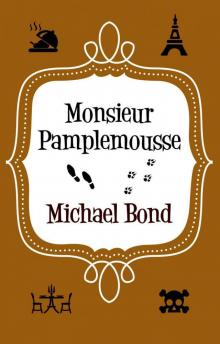 Monsieur Pamplemousse (Monsieur Pamplemousse Series)
Monsieur Pamplemousse (Monsieur Pamplemousse Series) Paddington Here and Now
Paddington Here and Now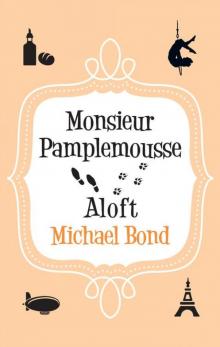 Monsieur Pamplemousse Aloft
Monsieur Pamplemousse Aloft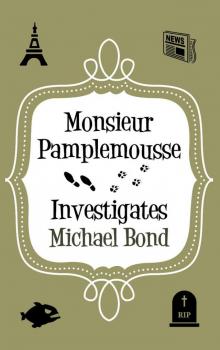 Monsieur Pamplemousse Investigates
Monsieur Pamplemousse Investigates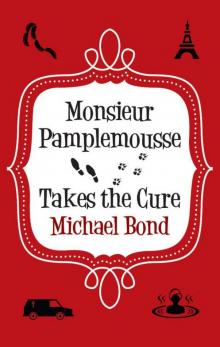 Monsieur Pamplemousse Takes the Cure
Monsieur Pamplemousse Takes the Cure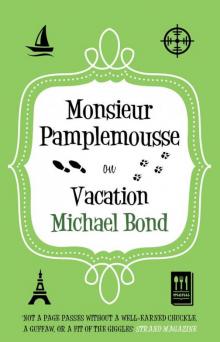 Monsieur Pamplemousse on Vacation
Monsieur Pamplemousse on Vacation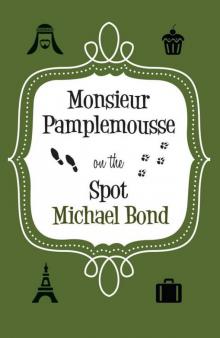 Monsieur Pamplemousse on the Spot
Monsieur Pamplemousse on the Spot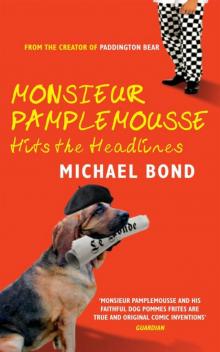 Monsieur Pamplemousse Hits the Headlines
Monsieur Pamplemousse Hits the Headlines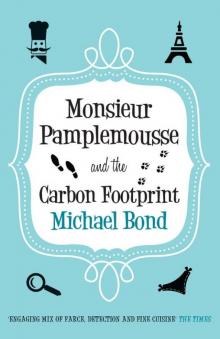 Monsieur Pamplemousse and the Carbon Footprint
Monsieur Pamplemousse and the Carbon Footprint Love from Paddington
Love from Paddington Paddington’s Finest Hour
Paddington’s Finest Hour Paddington Complete Novels
Paddington Complete Novels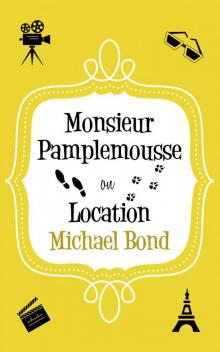 Monsieur Pamplemousse On Location
Monsieur Pamplemousse On Location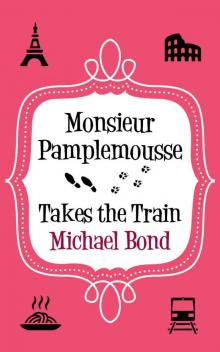 Monsieur Pamplemousse Takes the Train
Monsieur Pamplemousse Takes the Train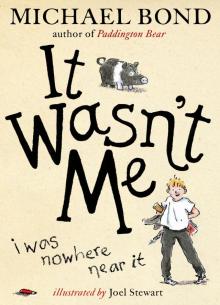 It Wasn’t Me!
It Wasn’t Me! Paddington Races Ahead
Paddington Races Ahead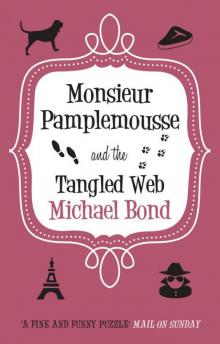 Monsieur Pamplemousse and the Tangled Web
Monsieur Pamplemousse and the Tangled Web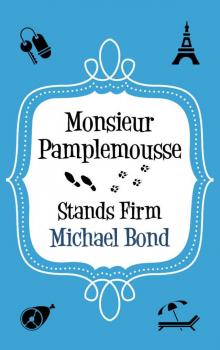 Monsieur Pamplemousse Stands Firm
Monsieur Pamplemousse Stands Firm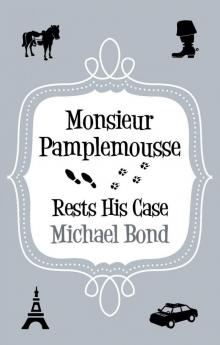 Monsieur Pamplemousse Rests His Case
Monsieur Pamplemousse Rests His Case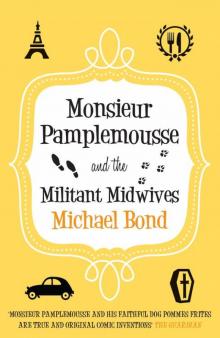 Monsieur Pamplemousse and the Militant Midwives
Monsieur Pamplemousse and the Militant Midwives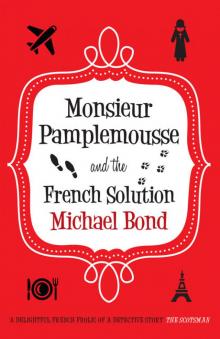 Monsieur Pamplemousse and the French Solution
Monsieur Pamplemousse and the French Solution Paddington Helps Out
Paddington Helps Out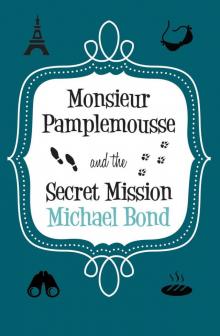 Monsieur Pamplemousse & the Secret Mission (Monsieur Pamplemousse Series)
Monsieur Pamplemousse & the Secret Mission (Monsieur Pamplemousse Series)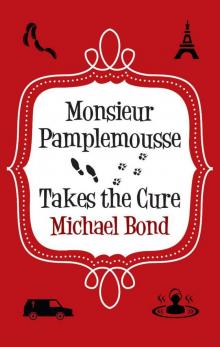 Monsieur Pamplemousse Takes the Cure (Monsieur Pamplemousse Series)
Monsieur Pamplemousse Takes the Cure (Monsieur Pamplemousse Series) A Bear Called Paddington
A Bear Called Paddington